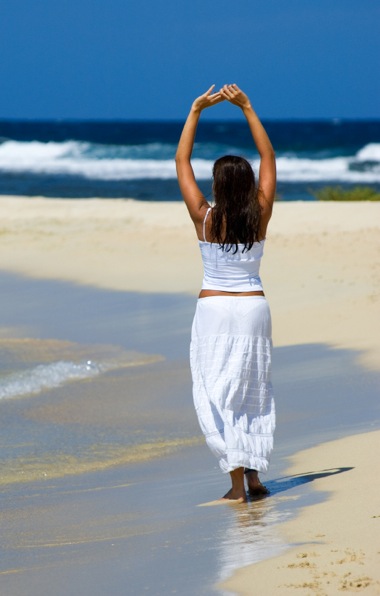Mindfulness As Good Medicine
 Every day a new report surfaces to trumpet what we should all be doing to be healthier: The secret is probiotics! Turn upside down for 5 minutes every day! Eat no white food: sugar, flour, dairy! Drink 5 cups of green tea every day! Get colonics once a month! Eat 1/2 ounce of chocolate with every meal! And on and on.
Every day a new report surfaces to trumpet what we should all be doing to be healthier: The secret is probiotics! Turn upside down for 5 minutes every day! Eat no white food: sugar, flour, dairy! Drink 5 cups of green tea every day! Get colonics once a month! Eat 1/2 ounce of chocolate with every meal! And on and on.
We become lost in the mechanics of what to do solely for our physical entities. While it’s crucial to be aware of good health habits on this level, we often times miss the deeper understanding of where good health actually comes: from an integrated approach with good living habits in general. These are practiced on a regular basis to feed the mental, emotional, and spiritual, as well as physical, attributes of the person.
In thinking about how to cultivate optimal health and wellness for oneself, we turn to the term, “mindfulness”: The principle of mindfulness at first may seem to be a strange thing to put into a discussion about health and wellness. But when it is accepted as the guiding spiritual principle of how we want to live, then it becomes clear that nothing we hope to gain for ourselves in terms of relative health – neither physical, mental, or emotional, would be possible without it. Mindfulness can best be described as consciousness of the present moment, but it’s also linked to the theory of the mind-body connection, and so it becomes the heart of holistic living. Holistic living means living in balance and harmony, within ourselves and with everything around us.
We create peace, beauty, and abundance out of this mindset. We understand this interconnectedness – the endless web – of each and every thing that exists: the root word of holistic is the Greek word, holos, meaning “all”, “entire”, “total”. We come to realize that it is applicable to every single decision, every choice, every movement and behavior we make throughout every day. Rather than feel this is an impossible burden to struggle under, we embrace the awe-inspiring perfection of it, and seek to honor and support it, precisely because we believe it will give us a richer, more profound life.
We also know that life is full of unexpected crisis, big and large, that are part of the fabric of everyday life. Continually feeling “in crisis”, can chip away at our emotional stability, which in turn, effects our physical health. Mindfulness gives us a perfect tool with which to keep everything in perspective and weather any challenges that we come up against, to know that our everyday health habits we’ve been cultivating all along, will keep our bodies strong, and our minds sharp. We understand that a diet full of healthful greens and fruits instead of sodas and fast food, helps us to stay balanced and less at the effect of difficult and negative situations. We get short tempered and sick less often. Soon we begin experiencing the payoff of mindfulness: our happiness and peace begin to radiate from within, and are no longer dependent on external stimulus (money, shopping, alcohol/drugs, etc.).
From the very narrow perspective of our own personal journey, which so often seems about just struggling to put one foot in front of the next, mindfulness now gives up the ability to lift our eyes up and look around a little. What we see is that far from just our choices about food and exercise (although they’re a huge part of it), we have a wide-ranging knowledge of how to live life on a daily basis as member of a collective consciousness. We can begin to reach out and share what we know with others. Generosity and gratitude are other qualities such as patience, acceptance, and trust, which provide a solid foundation for mindfulness practice.
Our mindfulness helps us make sure our lifestyle habits and choices don’t harm the environment, it ensures the workers who labor in the growing fields or the factories who make our consumable goods, enjoy decent living wages and safe working conditions, and that the final resting places of most of these goods aren’t just landfills, but perhaps a new life repurposed as another useful object. In this way, mindfulness begins to be reflected in the choices we make for our elected officials, and in the way in which we hold them, and our institutions, morally and ethically accountable to our communities. From this perspective, collective inner spiritual transformation, can have an effect on our world economies. By that same measure, transformations in how the world does its business, cannot happen without collective spiritual re-orientation.
The goal we all have is to live a long and happily as possible. You live longer and more fully when you are balanced, aware, and in the moment. Mindfulness is happiness made manifest.


Recent Comments